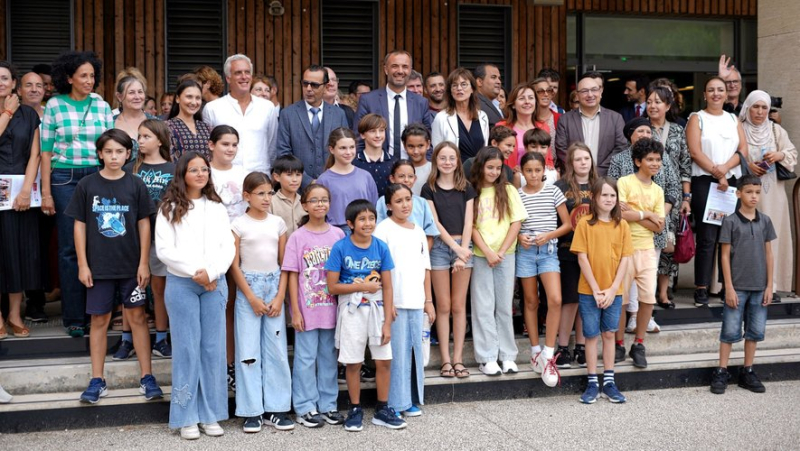The Jules Guesde high school in Montpellier inaugurates its international educational establishment for learning languages from CP

Frédéric Pagneux, proviseur, Carole Delga présidente la Région, Sophie Béjean, rectrice, Michaël Delafosse, maire de Montpellier et Renaud Calvat, vice-président du Département autour des 6e de l'EPLEI. MIDI LIBRE – DORIAN CAYUELA
The prefiguration of a Local Public Establishment for International Education (EPLEI) was launched this Friday, at the Jules-Guesde high school in Montpellier, with, as a first step, the opening of a sixth-grade class composed of two courses: one in Anglo-American, the other in Japanese. In addition to the existing international sections in the second year, in Anglo-American, Chinese and Arabic.
They are the work of Jean-Michel Blanquer. Conceived in 2007, but created by article 32 of the law For a school of trust, of July 26, 2019, the Local Public Establishments of International Education provide throughout schooling, reinforced teaching in foreign languages, from primary to final year, alongside the teaching of French.
Born from a desire between the City, Department, Region and Academy
They prepare either for the international option of the national brevet diploma (DNB) and the international option of the baccalaureate (OIB), or for the European baccalaureate.
The day after the promulgation of the law in 2019, freshly named on the Montpellier academy after the rectorate of Strasbourg, seat of many European institutions and international organizations, the project of an EPLEI sounds like an obvious choice for Sophie Béjean, who does not hide her joy at seeing a common desire come to fruition. "I am very happy to see this project that we are carrying out with the Region, the Department, the City and the Metropolis of Montpellier come to fruition".
The project, which took 4 years to complete, is estimated at 7 million euros. The financial contributions of each community remain to be finalized, the work itself is being managed by the Region.
Six establishments of this type throughout France
The objective of this EPLEI, which still only exists in six copies in France, is to “allow students to enroll in international courses, from CP to Baccalaureate", explains the rector. “It will be a major asset in economic development”, adds Michaël Delafosse, “enabling the education of the children of Med Vallée researchers in particular”.
The EPLEI, at the heart of the Lycée Jules Guesde, will therefore combine by 2026 a primary school, a middle school and a high school with a single head of establishment, Frédéric Pagneux. In 2030, students will benefit from a complete pathway, from CP to Bac. For now, it is the opening of a 6th grade class of 30 students around six teachers, composed of two pathways, one Anglo-American, the other Japanese, which was celebrated at the start of the 2024 school year.
"I love sushi"
Haroun, is a 10-year-old student from Juvignac who came to learn Japanese, but also to learn “in Japanese”, this option being for later : “I want to be original and not do like everyone else. I didn't want to do German or Spanish”.Like Juliette who later dreams “of going abroad”, or Jules who “loves manga… and sushi”.
Catapulted into high school before their time, the 30 “little ones” as the principal calls them, benefit from supervision and support appropriate to their age, “we have a playground just for us”!”, Haroun points out.
The choice of the Jules Guesde high school is motivated by its location “promoting social diversity” and its many internationally oriented training courses via its Chinese, American and Arabic sections which now bring together 205 students.
36% of students from disadvantaged families
Initially, the creation of these EPLEIs had nevertheless caused some controversy. For the UNSA union, for example, “the requirement for a high level of foreign language proficiency inevitably leads to recruitment that is very socially marked, most often children of foreign diplomats or executives of multinationals”.
Argument refuted by Sophie Béjean: “36% of students come from disadvantaged families, a third from middle-class families, another third from well-off families. The objective has been achieved. It's written in the law! 30% of students must be from the sector. The establishment offers a path of excellence, in equal opportunities. Far from any elitism.
The same friends from 6th grade to 12th grade
Aïcha, mother of little Youssra, 11 years old, enrolled in the Anglo-American section, confirms, “I live in Petit-Bard ! It's a real stroke of luck for her". Enthusiasm shared by the little girl who finds, by the way, "great to keep the same friends and girlfriends from 6th grade to 12th grade !".
As for Céline Belline, former executive at Sanofi who is working on a drug to cure hearing loss through Cilcare, "we were eagerly awaiting this initiative, for our future recruits capable of working internationally !".
Same enthusiasm for this executive at Royal Canin, who spent seven years in Japan: “Among our 1200 employees, 200 are foreigners, which represents 50 different passports! They all have needs in terms of education. It was about time!”.
I subscribe to read the rest




